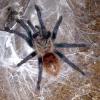Indeed, all ants are ectotherms, meaning the biological processes of development and metabolism are dependent on external sources of heat, similar to reptiles and amphibians.
All ants have optimal temperature ranges that coincide with the natural geographic ranges where they have evolved over millions of years. For ants originating in the tropics, a warmer range of temperatures is more commonly preferred, while cooler temperatures may slow or stop development completely. For ants more established in northern latitudes, optimal development may occur closer to room temperature, whereas temperature extremes on either end may hinder development.
Ants are masters at manipulating their environment to achieve a more stable, preferred temperature, which often varies considerably to the recorded temperature or conditions above ground. They dig several feet down into the earth, create labyrinths of sophisticated climate control systems, and otherwise manufacture a microclimate perfectly designed by nature to successfully rear the next generation of ants.
Within the confines of a formicarium, however—especially a pre-formed formicarium—ants seldom have the luxury of this flexibility. Therefore, providing a range of temperatures with the aid of a heating cable snaking across a formicarium is the best way to determine which temperatures your ants prefer (are they hugging the heat cable, or distancing themselves from it?), and to more closely mimic the natural climatic breadth found in the natural world.
There are many papers that have studied and documented these correlations. If you are curious about a particular species, a quick Google search may yield just the answers you're after.
Edited by drtrmiller, April 20 2019 - 8:27 PM.























